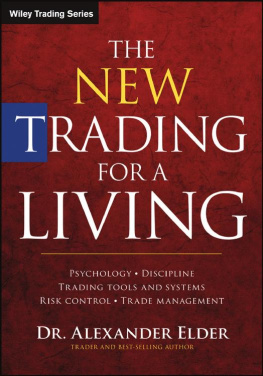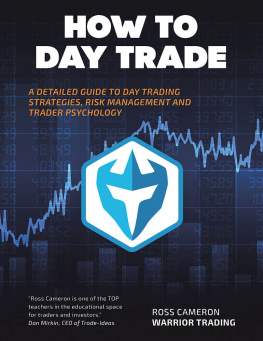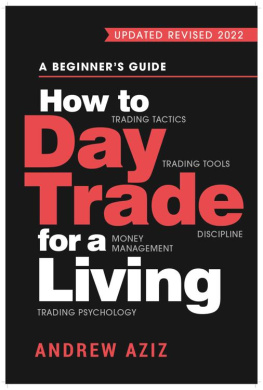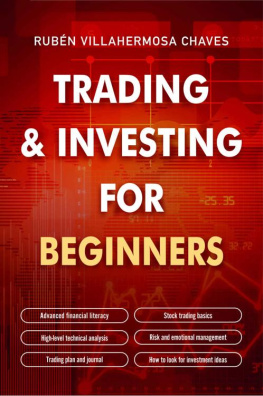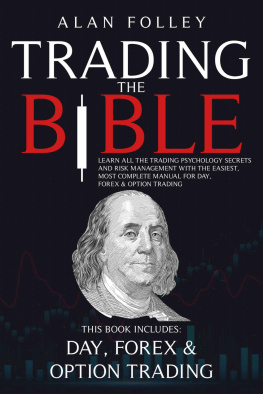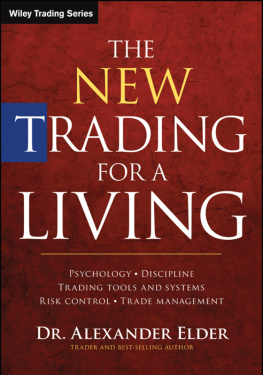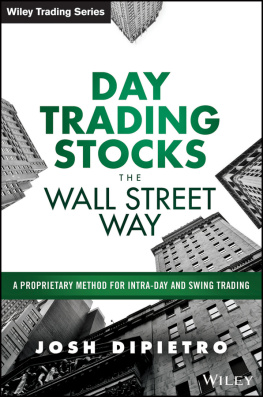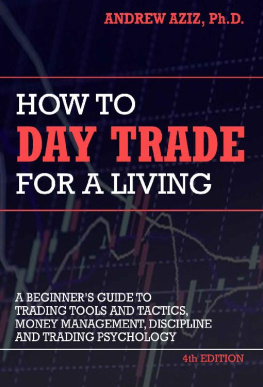Alexander Elder - The new trading for a living: psychology, discipline, trading tools and systems and risk control, trade management
Here you can read online Alexander Elder - The new trading for a living: psychology, discipline, trading tools and systems and risk control, trade management full text of the book (entire story) in english for free. Download pdf and epub, get meaning, cover and reviews about this ebook. City: Hoboken, New Jersey, year: 2014, publisher: John Wiley & Sons, genre: Business. Description of the work, (preface) as well as reviews are available. Best literature library LitArk.com created for fans of good reading and offers a wide selection of genres:
Romance novel
Science fiction
Adventure
Detective
Science
History
Home and family
Prose
Art
Politics
Computer
Non-fiction
Religion
Business
Children
Humor
Choose a favorite category and find really read worthwhile books. Enjoy immersion in the world of imagination, feel the emotions of the characters or learn something new for yourself, make an fascinating discovery.
- Book:The new trading for a living: psychology, discipline, trading tools and systems and risk control, trade management
- Author:
- Publisher:John Wiley & Sons
- Genre:
- Year:2014
- City:Hoboken, New Jersey
- Rating:3 / 5
- Favourites:Add to favourites
- Your mark:
- 60
- 1
- 2
- 3
- 4
- 5
The new trading for a living: psychology, discipline, trading tools and systems and risk control, trade management: summary, description and annotation
We offer to read an annotation, description, summary or preface (depends on what the author of the book "The new trading for a living: psychology, discipline, trading tools and systems and risk control, trade management" wrote himself). If you haven't found the necessary information about the book — write in the comments, we will try to find it.
Alexander Elder: author's other books
Who wrote The new trading for a living: psychology, discipline, trading tools and systems and risk control, trade management? Find out the surname, the name of the author of the book and a list of all author's works by series.
The new trading for a living: psychology, discipline, trading tools and systems and risk control, trade management — read online for free the complete book (whole text) full work
Below is the text of the book, divided by pages. System saving the place of the last page read, allows you to conveniently read the book "The new trading for a living: psychology, discipline, trading tools and systems and risk control, trade management" online for free, without having to search again every time where you left off. Put a bookmark, and you can go to the page where you finished reading at any time.
Font size:
Interval:
Bookmark:
The New Trading
for a Living
Psychology Discipline
Trading Tools and Systems
Risk Control Trade Management
Dr. Alexander Elder
www.elder.com
www.spiketrade.com
WILEY
Cover design: Paul DiNovo
Copyright 2014 by Dr. Alexander Elder. All rights reserved.
Published by John Wiley & Sons, Inc., Hoboken, New Jersey.
Published simultaneously in Canada.
Library of Congress Cataloging-in-Publication Data:
ISBN 978-1-118-44392-7 (Hardcover)
ISBN 978-1-118-96367-8 (ebk)
ISBN 978-1-118-96368-5 (ebk)
To the memory of Lou Taylor
a wise man, a savvy trader, and a true friend.
Contents
Trading for a Living was published in 1993 and became an international best seller. It remains at the top of many reading lists, as friends recommend it to friends and trading firms give it to their new hires. All these years, I resisted revising my book because I trusted and liked its internal logic. I traded, traveled, wrote other books, and taught a few classes. Now, 21 years later, I agreed to update my most popular book so that you can benefit from the new technologies as well as the lessons Ive learned.
My late great friend Lou Taylor, to whom this book is dedicated, used to joke: If I get half a percent smarter each year, Ill be a genius by the time I die. Revising my very first book felt like reliving my youth with the benefit of experience.
In planning this update, I thought of a building complex in Vienna, Austria called the Gasometer. At its core are multistory storage tanks, erected by Austrian bricklayers in 1927. When modern technology made huge gas cylinders obsolete, architects converted them into modern apartments. They punched wide openings in brick walls, creating panoramic views, installed floors and elevators, and added glass-enclosed penthouses. I used to stay in one of them and wanted my new book to follow that model of blending old craftsmanship with new technology.
Before you begin reading this book, ask yourself: whats the single most important step you can take to become a successful trader?
Psychology is important. Since I was actively practicing psychiatry while writing the original Trading for a Living, its psychology part stood the test of time and I changed it very little in this new edition.
Market analysis is very importantbut remember that when we look at a chart, we deal with only five pieces of datathe open, the high, the low, the close and volume. Piling up masses of indicators and patterns on top of those five values only increases confusion. Less is often more. If youve read Trading for a Living, youll see that Ive reduced the number of technical chapters and moved some of them into a downloadable addendum. On the other hand, I added several new chapters that focus on new tools, notably the Impulse system. I also added a section on stops, profit targets and other practical details.
Money management is extremely important because financial markets are hotbeds of risk. That was the weakest part of the original book, and I completely rewrote it. One of many tools youll discover will be the Iron Triangle of risk control.
Psychology, trading tactics, and money management are the three pillars of success, but there is the fourth factor that ties them together. That factorwhich integrates all othersis record-keeping.
Keeping good records will enable you to learn from your experiences. Itll help you break out of the vicious circle of small gains and big losses, running like a squirrel in a barrel, sweating and stressed but never getting anywhere. Keeping good records will make you your own teacher and a better trader. Ill show you several types of records you need to keep and will share several of my trade diaries.
If youre a new reader, welcome to the journey. If youve already read Trading for a Living, I hope youll find this new book two decades smarter than the first.
Dr. Alexander Elder
New YorkVermont, 2014
- 1. TradingThe Last Frontier
You can be free. You can live and work anywhere in the world. You can be independent from routine and not answer to anybody.
This is the life of a successful trader.
Many aspire to it but few succeed. An amateur looks at a quote screen and sees millions of dollars sparkle in front of his face. He reaches for the moneyand loses. He reaches againand loses more. Traders lose because the game is hard, or out of ignorance, or from lack of discipline. If any of these ail you, I wrote this book for you.
In the summer of 1976, I drove from New York to California. I took along a few books on psychiatry (I was a first-year psychiatric resident), several histories, and put a paperback copy of Engels How to Buy Stocks into the trunk of my old Dodge. Little did I know that a dog-eared paperback, borrowed from a lawyer friend, would in due time change the course of my life. That friend, incidentally, had a perfect reverse golden touchany investment he touched went under water. But thats another story.
I gulped down the Engel book in campgrounds across America, finishing it on a Pacific beach in La Jolla. I had known nothing about the stock market, and the idea of making money by thinking gripped me.
I grew up in the Soviet Union in the days when it was, in the words of a former U.S. president, an evil empire. I hated the Soviet system and wanted to get out, but emigration was forbidden. I entered college at 16, graduated medical school at 22, completed my residency, and then took a job as a ships doctor. Now I could break free! I jumped the Soviet ship in Abidjan, Ivory Coast.
I ran to the U.S. Embassy through the clogged dusty streets of an African port city, chased by my ex-crewmates. The embassy put me in a safe house and then on a plane to New York. I landed at Kennedy Airport in February 1974, arriving from Africa with $25 in my pocket. I spoke some English, but did not know a soul in this country.
I had no idea what stocks, bonds, futures, or options were and sometimes got a queasy feeling just from looking at the American dollar bills in my wallet. In the old country, a handful of them could buy you three years in Siberia.
Reading How to Buy Stocks opened a whole new world for me. When I returned to New York, I bought my first stockit was KinderCare. A very bad thing happenedI made money on my first trade and then the second one, leaving me with a delusion that making money in the markets was easy. It took me a couple of years to get rid of that notion.
My professional career proceeded on a separate track. I completed a residency in psychiatry at a major university hospital, studied at the New York Psychoanalytic Institute, and served as book editor for the largest psychiatric newspaper in the United States. I still have my license, but my professional practice these days is at most an hour or two per month. I am busy trading, love traveling, and do some teaching.
Learning to trade has been a long journeywith soaring highs and aching lows. In moving forwardor in circlesI repeatedly knocked my head against the wall and ran my trading account into the ground. Each time I returned to a hospital job, put a stake together, read, thought, did more testing, and then started trading again.
My trading slowly improved, but the breakthrough came when I realized that the key to winning was inside my head and not inside a computer. Psychiatry gave me the insight into trading that I will share with you.
For many years I had a friend whose wife was fat. She was an elegant dresser, and she had been on a diet for as long as I had known her. She said she wanted to lose weight and she didnt eat cake or potatoes in front of peoplebut when I came into her kitchen, Id see her go at it with a big fork. She said she wanted to be slim, but remained fat.
Next pageFont size:
Interval:
Bookmark:
Similar books «The new trading for a living: psychology, discipline, trading tools and systems and risk control, trade management»
Look at similar books to The new trading for a living: psychology, discipline, trading tools and systems and risk control, trade management. We have selected literature similar in name and meaning in the hope of providing readers with more options to find new, interesting, not yet read works.
Discussion, reviews of the book The new trading for a living: psychology, discipline, trading tools and systems and risk control, trade management and just readers' own opinions. Leave your comments, write what you think about the work, its meaning or the main characters. Specify what exactly you liked and what you didn't like, and why you think so.

